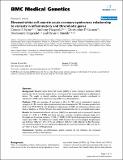| dc.contributor.author | Byrne, Connie E. | |
| dc.contributor.author | Fitzgerald, Desmond J. | |
| dc.contributor.author | Shields, Denis C. | |
| dc.contributor.author | Fitzgerald, Anthony | |
| dc.contributor.author | Cannon, Christopher Paul | |
| dc.date.accessioned | 2011-03-25T19:35:59Z | |
| dc.date.issued | 2004 | |
| dc.identifier.citation | Byrne, Connie E., Anthony Fitzgerald, Christopher Paul Cannon, Desmond J. Fitzgerald, and Denis C. Shields. 2004. Elevated white cell count in acute coronary syndromes: Relationship to variants in inflammatory and thrombotic genes. BMC Medical Genetics 5:13. | en_US |
| dc.identifier.issn | 1471-2350 | en_US |
| dc.identifier.uri | http://nrs.harvard.edu/urn-3:HUL.InstRepos:4774133 | |
| dc.description.abstract | Background: Elevated white blood cell counts (WBC) in acute coronary syndromes (ACS) increase the risk of recurrent events, but it is not known if this is exacerbated by pro-inflammatory factors. We sought to identify whether pro-inflammatory genetic variants contributed to alterations in WBC and C-reactive protein (CRP) in an ACS population. Methods: WBC and genotype of interleukin 6 (IL-6 G-174C) and of interleukin-1 receptor antagonist (IL1RN intronic repeat polymorphism) were investigated in 732 Caucasian patients with ACS in the OPUS-TIMI-16 trial. Samples for measurement of WBC and inflammatory factors were taken at baseline, i.e. Within 72 hours of an acute myocardial infarction or an unstable angina event. Results: An increased white blood cell count (WBC) was associated with an increased C-reactive protein (r = 0.23, p < 0.001) and there was also a positive correlation between levels of β-fibrinogen and C-reactive protein (r = 0.42, p < 0.0001). IL1RN and IL6 genotypes had no significant impact upon WBC. The difference in median WBC between the two homozygote IL6 genotypes was 0.21/mm3 (95% CI = -0.41, 0.77), and -0.03/mm3 (95% CI = -0.55, 0.86) for IL1RN. Moreover, the composite endpoint was not significantly affected by an interaction between WBC and the IL1 (p = 0.61) or IL6 (p = 0.48) genotype. Conclusions: Cytokine pro-inflammatory genetic variants do not influence the increased inflammatory profile of ACS patients. | en_US |
| dc.language.iso | en_US | en_US |
| dc.publisher | BioMed Central | en_US |
| dc.relation.isversionof | doi:10.1186/1471-2350-5-13 | en_US |
| dc.relation.hasversion | http://www.ncbi.nlm.nih.gov/pmc/articles/PMC425582/pdf/ | en_US |
| dash.license | LAA | |
| dc.title | Elevated White Cell Count in Acute Coronary Syndromes: Relationship to Variants in Inflammatory and Thrombotic Genes | en_US |
| dc.type | Journal Article | en_US |
| dc.description.version | Version of Record | en_US |
| dc.relation.journal | BMC Medical Genetics | en_US |
| dash.depositing.author | Cannon, Christopher Paul | |
| dc.date.available | 2011-03-25T19:35:59Z | |
| dash.affiliation.other | HMS^Medicine-Brigham and Women's Hospital | en_US |
| dc.identifier.doi | 10.1186/1471-2350-5-13 | * |
| dash.authorsordered | false | |
| dash.contributor.affiliated | Cannon, Christopher | |


